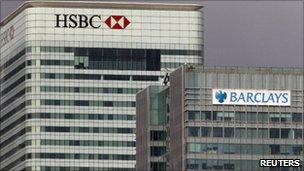Chancellor Osborne backs ring-fencing of retail banks
- Published
- comments

HSBC, Barclays and Royal Bank of Scotland will all have to ring-fence their retail banks
Britain's biggest banks will be forced to put a firewall around their retail operations, the chancellor will announce on Wednesday at the Mansion House.
In his annual address to the eminences of the City of London, George Osborne will pledge to legislate for a so-called ring-fence around the parts of giant banks that look after our savings, make loans and move money around the economy. This was the central proposal made by the Independent Commission on Banking (ICB) in its April interim report.
Mr Osborne will make two other important announcements:
He is expected to set in train the privatisation of Northern Rock, the mortgage bank nationalised at the start of the financial crisis, in early 2008.
He will announce that UK retail banks, and the retail banking parts of giant banks, will have to hold more capital as a protection against future losses than the new international minimum of 7% of risk-weighted assets.
The hope is that by putting retail banking into a separate legal subsidiary, ring-fenced from the trading and investment banking activities of a big bank, the vital parts of our giant banks will be less exposed to danger in a crisis.
The idea is that the retail banking bits of Barclays, HSBC and Royal Bank of Scotland will have more capital to absorb possible losses, and - in conditions of extreme danger - they could be more easily hived off and rescued (to use the jargon, they could be more easily "resolved").
These reforms will take the British banking system into uncharted territory. They will lead to a reconstruction of HSBC, Barclays and RBS and they will have a profound impact on the way those giant banks are managed.
The minutiae of how retail banking operations are to be insulated from investment banking are yet to be worked out. The practical and legal challenges are formidable.
Mr Osborne's decision to go for the retail ring-fence will be controversial.
On the one hand, he'll be criticised for being too timid by proponents of formal break-ups of our biggest banks. In the past, those calling for the dismantling of HSBC, Barclays and Royal Bank included the business secretary, Vince Cable, although more recently Mr Cable signalled his support for the ICB's recommendations.
By contrast, Stephen Hester, chief executive of the semi-nationalised Royal Bank of Scotland, told MPs he feared that putting retail banks into separate subsidiaries could increase the riskiness of the banking system and put up costs for banks and their customers.
Mr Hester's argument was that if retail banks are explicitly perceived to be the special bits of banks, likely always to be rescued by taxpayers in extremis, those retail banks could end up taking even more dangerous risks.
Also, Mr Hester voiced concerns about the impact for the costs for banks like his of having to put separate large pots of capital into investment and retail banking operations.
Strikingly, HSBC recently signalled its support for ring-fencing retail banking, and made a recommendation for how this might be done.
Under HSBC's proposal, the ring fence would go around all the activities defined under current accounting conventions as banking, as opposed to trading. So under the HSBC model, retail banking would include loans to fairly big companies, as well the savings of retail customers, and loans to retail customers.
No other country has responded in quite this way to the great crash of 2007-8. In the US, President Obama is imposing restrictions on the trading and investment activities of all US banks, under what's known as the Volcker Rule.
Some may see Mr Osborne's reforms as a British version of the Glass Steagall separation of retail and investment banking that was introduced in the US in response to the financial and economic disasters of the 1930s.
The ICB's interim report suggested a minimum capital ratio for retail banks of 10%, which Mr Osborne is understood to support, although he won't quote any precise number for the new minimum capital ratio.
A source close to the chancellor said there was "nothing sinister" in Mr Osborne's reluctance to quote a particular number for how much capital above the international floor should be held by British retail banks. "Ten per cent is certainly the right ballpark", he said.